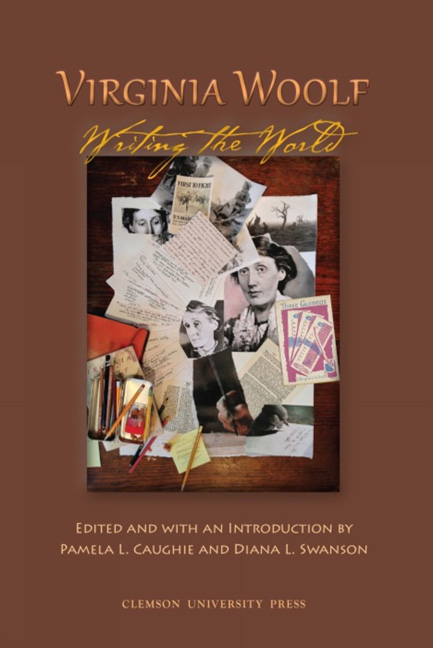Book contents
- Frontmatter
- Table of Contents
- Introduction
- Acknowledgmen
- Abbreviation
- WAR AND PEACE
- WORLD WRITER(S)
- Teaching Privileges: Three Guineas and the Cost of Global Citizenship
- From Guineas to Riyals: Teaching Woolf in the Middle East
- Fashionable Misconceptions: The Creation of the East in Virginia Woolf's Orlando
- From London to Taipei: Writing the Past in “Wandering in the Garden, Waking from a Dream” and Mrs. Dalloway
- An Estranged Intimacy with the World: The Postcolonial Woolf's Planetary Love in The Voyage Out
- “Shakespeare's Sister”: Woolf in the World Before A Room of One's Own
- Leonard Woolf: Writing the World of Palestine, Zionism, and the State of Israel
- ANIMAL AND NATURAL WORLD
- WRITING AND WORLDMAKING
- Notes on Contributors
- Conference Program
- Appendix: Virginia Woolf Conference Exhibit Items, Newberry Library
Leonard Woolf: Writing the World of Palestine, Zionism, and the State of Israel
from WORLD WRITER(S)
- Frontmatter
- Table of Contents
- Introduction
- Acknowledgmen
- Abbreviation
- WAR AND PEACE
- WORLD WRITER(S)
- Teaching Privileges: Three Guineas and the Cost of Global Citizenship
- From Guineas to Riyals: Teaching Woolf in the Middle East
- Fashionable Misconceptions: The Creation of the East in Virginia Woolf's Orlando
- From London to Taipei: Writing the Past in “Wandering in the Garden, Waking from a Dream” and Mrs. Dalloway
- An Estranged Intimacy with the World: The Postcolonial Woolf's Planetary Love in The Voyage Out
- “Shakespeare's Sister”: Woolf in the World Before A Room of One's Own
- Leonard Woolf: Writing the World of Palestine, Zionism, and the State of Israel
- ANIMAL AND NATURAL WORLD
- WRITING AND WORLDMAKING
- Notes on Contributors
- Conference Program
- Appendix: Virginia Woolf Conference Exhibit Items, Newberry Library
Summary
There is no record of Virginia Woolf's attitude toward Leonard's interaction with British Zionists and Assimilationists and the question of Palestine, though her disparaging remarks about the Woolf family's Jewishness and her purported anti- Semitism continue to spark debate. Yet she responded enthusiastically to Leonard's plan to write a book on the Wandering Jew (D 2 111); she wrote a heart-rending diary account of a starving young Jewish girl (D 5 19); and she railed against the plight of English and European Jews in Three Guineas : “[t]he whole iniquity of dictatorship, whether in Oxford or Cambridge, in Whitehall or Downing Street, against Jews or against women, in England, or in Germany, in Italy or in Spain” (TG 103). She may have come to understand and sympathize with the plight of European Jews, but it was Leonard who immersed himself in the immensely complex politics of “the Jewish question.”
Leonard Woolf's long life and life-long involvement with international politics, law, and economics created a body of work that serves as a lens through which we can better see and understand virtually every major historical event and movement of the twentieth century. In fact, his willingness to take on controversial issues, to build policy arguments and express unequivocal convictions, and then to revisit and reassess these arguments and convictions as times and circumstances change, can still help us comprehend current events and controversies.
From his skepticism over the Balfour Declaration of 1917 and the British Mandate for Palestine that lasted until 1948, to the many articles concerning Palestine published in Political Quarterly and The New Statesman throughout the forties, to his visit to Israel in 1957, and finally to his letters written to Lord Fisher (former Archbishop of Canterbury) in defense of Israeli military strikes in 1968, Woolf demonstrated a complex and constantly evolving attitude toward Israel and Arab-Jewish relations. In 2013, the American Studies Association and many academic organizations around the world moved to boycott Israeli universities over Israel's Palestinian policies, the Presbyterian and Methodist churches divested themselves of their Israeli investments, and the MLA resolved to “criticize” Israel for denying scholars access to Palestinian universities (though the vote to endorse the resolution was not adopted because only 6% of the membership voted).
- Type
- Chapter
- Information
- Virginia Woolf: Writing the World , pp. 128 - 134Publisher: Liverpool University PressPrint publication year: 2015



